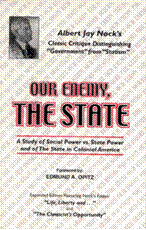Our Enemy the State
by Albert Jay Nock
 Review by Brian Wright
Review by Brian Wright
“Taking the state wherever found, striking into its history at any point, one sees no way to differentiate the activities of its founders, administrators, and beneficiaries from those of a professional criminal class.” — page 22
Everything is perfect about this work of private-scholarship art and high opinion, including the title: It doesn’t pussyfoot around, goes right for the jugular, the political-economic CMS (center of maximum sleaze). Can’t get more succinct:
“The State[1] is the bane of human existence; here’s why!”
Enemy is a classic work on individual liberty. Nock (1870-1945), like H.L. Mencken (1880-1956), was primetime while the American Super-State (ASS) came into its own. The watershed year for the ASS was 1913, when the Federal Reserve system and the 16th Amendment for the so-called income tax were deviously established.
Nock was sort of a private-enterpriser scholar, and he delivered Enemy as a series of public lectures at Columbia University (New York) in the 1930s. His foundation idea is humankind has two basic methods of survival: what he calls the social power and what he calls the State power.
Social power is how we normally live and freely interact and trade with one another without coercion—the economic means; State power is using aggression, directly and indirectly through government, to satisfy our needs—the political means.
There are two methods, or means, and only two, whereby man’s needs and desires can be satisfied. One is the production and exchange of wealth; this is the economic means. The other is the uncompensated appropriation of wealth produced by others; this is the political means…. The State, then, whether primitive, feudal, or merchant, is the organization of the political means. — page 26, 27
What Nock’s wonderful analysis does is to cut completely through the Gordian Knot of BS we’re constantly served that this government project or that government project will result in a beneficent outcome for us all. What’s this we stuff, Kemo Sabe?
When we understand the obvious difference between State power and social power, we only need to name a government project (or foreign policy adventure) to damn it. We see it as a simple act of aggression or confiscation by the political class upon (often) the productive class.
Nock provides a number of historical references and data points to consider when we analyze the destructive development of the State power. Indeed, he devotes a chapter to American colonial times, where one can see the conflict between the Statist Hamiltonians and the democratic Jeffersonians… who feared government money control, direct federal taxation, monopoly corporations, and the class warfare such centralized-power-enabling concepts generate.
All the stuff we have now.
The sad fact is, the Statists have pretty much taken over and the light at the end of the tunnel toward freedom fades. Here we sit at the beginning of the 21st century when every fear Nock warns us about has come to fruition. He was pessimistic: indeed history tells us when a society reaches the level of State power we find in the United States it collapses.
However:
Because of what I see as the imminent popularization of the Sacred Nonaggression Principle (SNaP)—and other developments—I have reason to believe that that collapse will be more in the nature of a root transformation to a free society. Nock could not have envisioned the Internet, radical life extension, the Free State Project, or selected achievements in rational philosophy… the explosion in free human consciousness that’s beginning to be felt worldwide.
So if Nock is such a pessimist—his much more famous colleague H.L. Mencken was even more pessimistic—why bother keeping his stuff on the reading list?
Well, because of his trenchant analysis, that’s why.
Trenchant is a very cool word, and many libertarian reviews of Enemy like to use that word to distill the essence of the Albert Jay Nock experience. Trenchant basically means distinct and clear cut, forceful and effective, strongly insightful.
For the cause-oriented liberty person, it is vital to read Our Enemy the State to give one the clarity to cut through the mental fog that decades of controlled media and compulsory government schooling have generated in the minds of too many citizens. And for the citizens who have been so mentally clouded, reading Albert Jay Nock can turn on a light bulb… leading to the discovery of ever more illuminating concepts from Rothbard, Rand, Bergland, Ruwart, Wright :)!, and a host of other fabulous authors.
 Our Enemy the State is the perfect place to start or to pick up the extraordinary chain of events of consciousness leading to world liberation. Be there. Be here.
Our Enemy the State is the perfect place to start or to pick up the extraordinary chain of events of consciousness leading to world liberation. Be there. Be here.
[1] Nock and other scholars of the time use initial-cap State as the name for “coercive government” at any level, to distinguish it from lower-case state, meaning a geographical region of a nation.
This post has been read 2741 times!


